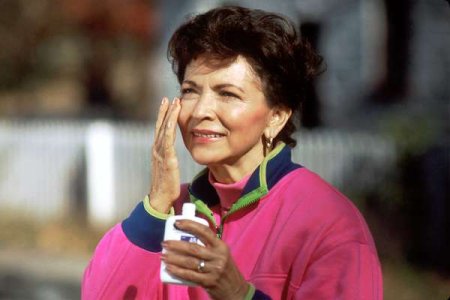Think sunscreen is enough? These 4 medications could still leave you vulnerable
- Replies 0
As temperatures rise and sunny days become more frequent, many people are eager to spend time outdoors.
But before you step into the sun, a leading dermatology specialist is warning that certain common medications could make your skin extra vulnerable to UV rays—potentially increasing your risk of severe burns, rashes, and even skin cancer.
If you’ve ever noticed you burn faster than usual or develop unexplained skin irritation, your medication might be the culprit.
Dr. Emily Alfonsi, medical director of Shade Skin, explains that photosensitivity—a heightened reaction to UV light—can be a serious issue for people taking certain drugs.
"Most people have no idea that their medication could be making them more sensitive to the sun," Alfonsi said.
She added, "They might notice they’re burning faster or developing unusual rashes, but they don’t immediately connect it to their medication."

Photosensitivity occurs when UV radiation chemically alters a medication in the skin, potentially causing blisters, swelling, peeling, itching, and hyperpigmentation.
Alfonsi has seen patients develop "second-degree sunburns with blistering, unexplained rashes or dark patches of skin," even with minimal sun exposure.
"For people on photosensitizing medications, a few minutes in the sun without protection can have serious consequences," she warned.
While many medications list sun sensitivity as a possible side effect, Dr. Alfonsi highlights four common types that can significantly increase your risk:
To minimize risks:
Want to know how years of skin neglect can take its toll?
A recent revelation has exposed shocking skin damage after 61 years of inadequate protection, leaving many wondering if it's ever too late to reverse the effects.
Plus, experts are shedding light on an often-overlooked anti-aging secret that could make all the difference in maintaining youthful, healthy skin.
 Have you ever experienced unexpected sunburns or rashes while on medication? Share your thoughts and experiences in the comments below. And if you’re looking for more ways to stay safe in the sun, check out our latest articles on sunscreen protection and skin health.
Have you ever experienced unexpected sunburns or rashes while on medication? Share your thoughts and experiences in the comments below. And if you’re looking for more ways to stay safe in the sun, check out our latest articles on sunscreen protection and skin health.
Also read:
But before you step into the sun, a leading dermatology specialist is warning that certain common medications could make your skin extra vulnerable to UV rays—potentially increasing your risk of severe burns, rashes, and even skin cancer.
If you’ve ever noticed you burn faster than usual or develop unexplained skin irritation, your medication might be the culprit.
Dr. Emily Alfonsi, medical director of Shade Skin, explains that photosensitivity—a heightened reaction to UV light—can be a serious issue for people taking certain drugs.
"Most people have no idea that their medication could be making them more sensitive to the sun," Alfonsi said.
She added, "They might notice they’re burning faster or developing unusual rashes, but they don’t immediately connect it to their medication."

Before you step outside, check your medicine cabinet—your skin may depend on it. Image source: National Cancer Institute / Unsplash
Photosensitivity occurs when UV radiation chemically alters a medication in the skin, potentially causing blisters, swelling, peeling, itching, and hyperpigmentation.
Alfonsi has seen patients develop "second-degree sunburns with blistering, unexplained rashes or dark patches of skin," even with minimal sun exposure.
"For people on photosensitizing medications, a few minutes in the sun without protection can have serious consequences," she warned.
While many medications list sun sensitivity as a possible side effect, Dr. Alfonsi highlights four common types that can significantly increase your risk:
- Antibiotics – Tetracyclines and fluoroquinolones, such as doxycycline, minocycline, ciprofloxacin (Cipro), and levofloxacin (Levaquin), can cause severe burns with even brief sun exposure.
- Diuretics – Often called “water pills,” these medications help the body eliminate excess salt and water. Studies have suggested that long-term use of diuretics like hydrochlorothiazide may be linked to an increased risk of squamous cell carcinoma, the second most common type of skin cancer in the US.
- NSAIDs (Non-Steroidal Anti-Inflammatory Drugs) – Common pain relievers such as ibuprofen have been linked to increased photosensitivity, particularly when used over long periods.
- Immunosuppressants – Medications like azathioprine, often prescribed to transplant patients and those with rheumatoid arthritis, can weaken the skin’s natural defenses against UV damage, making sunburns and long-term skin damage more likely.
To minimize risks:
- Be aware of any changes in your skin while taking these medications.
- If you notice unusual rashes or burns, consult your doctor.
- Avoid prolonged sun exposure, especially between 10 a.m. and 4 p.m.
- Use protective clothing, hats, and sunglasses in addition to sunscreen.
Want to know how years of skin neglect can take its toll?
A recent revelation has exposed shocking skin damage after 61 years of inadequate protection, leaving many wondering if it's ever too late to reverse the effects.
Plus, experts are shedding light on an often-overlooked anti-aging secret that could make all the difference in maintaining youthful, healthy skin.
Key Takeaways
- Certain medications may increase sensitivity to sunlight, posing a higher risk of skin cancer and other skin damage.
- Photosensitivity caused by medications can lead to severe skin reactions, even with minimal sun exposure.
- A variety of medications, including some antibiotics, diuretics, immunosuppressants, and NSAIDs, are known to cause photosensitivity.
- Protection strategies include applying sunscreen, wearing protective clothing, avoiding peak sun hours, and scheduling regular dermatologist check-ups.
Also read:






